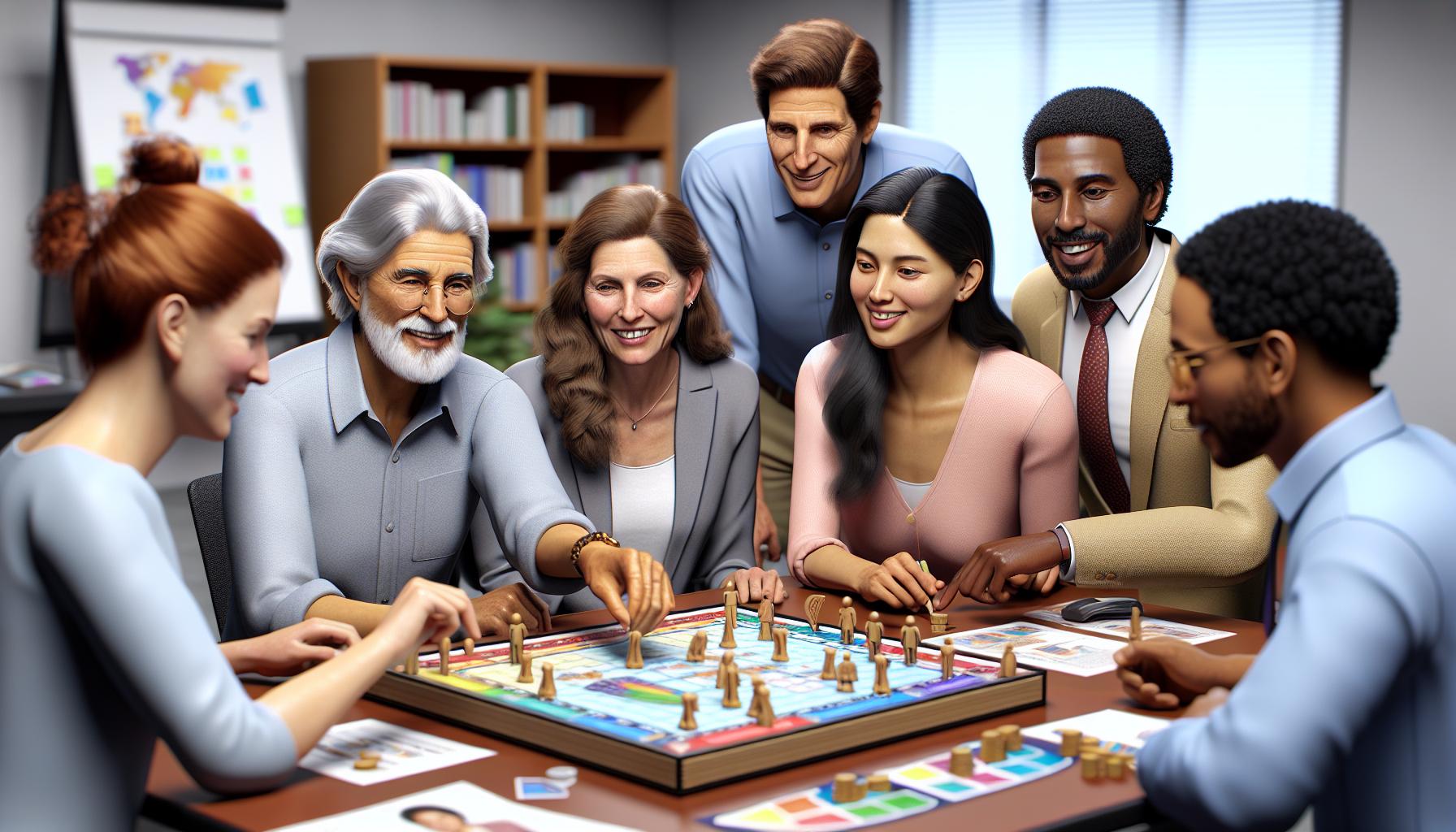As I dive into the world of adult learning, I often find myself exploring innovative ways to make education engaging and effective. Adult learning games have emerged as a powerful tool, transforming traditional methods into dynamic experiences. These games not only stimulate critical thinking but also foster collaboration and creativity among participants. I’ve seen firsthand how incorporating game-based learning can enhance retention and motivation. Whether it’s through interactive simulations or competitive quizzes, adults are embracing these methods to sharpen their skills and knowledge. Join me as I uncover the benefits of adult learning games and how they can revolutionize our approach to education.
- Innovative Learning Tools: Adult learning games provide a dynamic approach to education, promoting active participation and critical thinking among learners.
- Enhanced Engagement: Games make lessons captivating and less intimidating, leading to increased learner investment and enjoyment in the educational process.
- Improved Retention: Gamification facilitates better information retention, with studies showing that learners can recall 25% to 60% more material when engaged in game-based learning.
- Skill Development: These games focus on essential skills like decision-making and problem-solving, which are applicable in personal and professional contexts.
- Immediate Feedback: Players receive real-time feedback, allowing for quicker understanding and adjustments, thus fostering continuous learning and improvement.
- Variety of Formats: Adult learning games come in diverse formats, including digital simulations, role-playing, and educational board games, catering to different learning styles and environments.
Adult Learning Games
Adult learning games serve as innovative tools that significantly enhance educational experiences. These games promote active participation and encourage critical thinking, collaboration, and creativity among adult learners. By combining entertainment with educational objectives, adult learning games engage learners in a meaningful way, allowing them to apply knowledge in real-world situations.
Many types of adult learning games exist, including simulation games, role-playing games, and board games. These formats foster interaction and teamwork, making learning experiences memorable.
Benefits of Adult Learning Games
- Enhanced Engagement: Adult learning games capture attention, making lessons more captivating and less intimidating.
- Improved Retention: Gamification techniques encourage repetition, leading to better memory retention of the material.
- Skill Development: Many games focus on specific skills, such as decision-making and problem-solving, useful in both personal and professional contexts.
- Immediate Feedback: Players often receive instant feedback, helping them understand and correct mistakes quickly.
| Game Type | Description |
|---|---|
| Simulation Games | Replicate real-world scenarios for practical applications. |
| Role-Playing Games | Allow players to take on different characters and perspectives. |
| Educational Board Games | Combine strategy and learning in a fun, competitive format. |
Adult learning games represent a shift from traditional learning methods, providing a dynamic and interactive approach. They motivate learners to immerse themselves fully, leading to enhanced learning outcomes.
Benefits of Adult Learning Games

Adult learning games provide multiple advantages that enhance the educational experience. They engage learners actively, promoting deeper understanding and retention of knowledge.
Enhanced Engagement
Engagement increases when learners participate in games, as games create immersive experiences. Interactive challenges encourage teamwork and peer collaboration, fostering a supportive learning environment. Participants learn more effectively as they invest in the process, making education enjoyable. Games often use rewards and achievements, which motivate adults to continue exploring topics and enhance their commitment to learning.
Improved Retention
Retention improves significantly through the use of adult learning games. Game mechanics create a memorable learning experience, helping adults to recall information more easily. Immediate feedback during gameplay reinforces knowledge, allowing learners to make real-time adjustments. Studies show that people retain 25% to 60% more information when it’s presented in a gamified format compared to traditional methods. This results in higher mastery of skills and concepts, making game-based learning a powerful tool for adult education.
Types of Adult Learning Games

Adult learning games come in various formats, each designed to enhance engagement and facilitate effective learning. This section explores two primary categories: digital games and tabletop games.
Digital Games
Digital games offer immersive experiences that harness technology to engage adult learners. These games often simulate real-world scenarios, enabling players to practice skills in a safe environment. Examples include:
- Simulation Games: These games mimic real-life experiences, allowing players to manage projects, run businesses, or navigate complex situations. For instance, programs like SimCity or business simulation apps foster strategic thinking and decision-making.
- Serious Games: Serious games blend entertainment with education by focusing on specific learning objectives. These games instruct players on subjects like health, finance, or technology.
- Gamified Learning Platforms: Platforms such as Kahoot! and Quizlet transform standard learning modules into interactive experiences through quizzes, challenges, and point systems.
Digital games utilize analytics to measure progress and provide immediate feedback, enhancing the learning experience for adults.
Tabletop Games
Tabletop games create opportunities for face-to-face interactions and collaboration among adult learners. These games focus on teamwork and communication, making them effective for group learning. Notable examples include:
- Board Games: Games like Pandemic and Codenames require strategic thinking and cooperative play, promoting teamwork and critical thinking skills.
- Card Games: Educational card games, such as Apples to Apples or Cards Against Humanity (for mature themes), encourage players to think creatively and engage in discussions.
- Role-Playing Games (RPGs): RPGs, such as Dungeons & Dragons, facilitate skill development in communication, problem-solving, and creativity while immersing players in storytelling and teamwork.
Tabletop games foster personal interaction and allow material to be explored in depth, enhancing retention and understanding.
Designing Effective Adult Learning Games

Designing effective adult learning games requires a clear focus on key elements that enhance the learning experience. By prioritizing specific objectives and incorporating meaningful feedback, these games can significantly improve engagement and retention.
Understanding Learning Objectives
Understanding learning objectives is critical in game design. I define clear, measurable objectives that align with desired outcomes. For instance, if the goal is to improve decision-making skills, I create scenarios that require players to analyze information and make choices that impact their success in the game. Establishing objectives not only guides the development process but also ensures the game provides relevant learning experiences. Each game element, from rules to challenges, should directly support these objectives, creating a cohesive learning environment.
Incorporating Feedback
Incorporating feedback into adult learning games enhances motivation and promotes continuous improvement. I integrate immediate feedback mechanisms that inform players about their performance as they progress. For example, in a simulation game, players receive scoring or progress updates based on their choices and problem-solving approaches. This real-time feedback fosters a sense of achievement and encourages players to adjust their strategies. Additionally, peer feedback can be encouraged through discussions or reflections, allowing players to learn collaboratively and refine their skills effectively.
Case Studies and Examples
I’ve observed several practical applications of adult learning games that illustrate their effectiveness in various educational settings.
Case Study 1: Simulation Games in Corporate Training
A technology company implemented simulation games in their onboarding process. The game required new employees to navigate virtual scenarios mimicking real-world challenges. This approach improved engagement and retention rates significantly. Employees not only grasped the company’s culture quickly but also developed essential problem-solving skills. Pre-game retention assessments showed scores of 50%, while post-game assessments reached 85%.
Case Study 2: Educational Board Games in Professional Development
A non-profit organization utilized educational board games during a professional development workshop. Participants engaged in role-playing scenarios that encouraged teamwork and communication. Feedback indicated a 90% satisfaction rate, with 75% of participants stating they felt more confident applying what they learned. As a result, the organization saw a measurable improvement in team collaboration post-training, with project completion times cut by 30%.
Case Study 3: Gamified Learning Platforms in Higher Education
An online university adopted a gamified learning platform for adult learners returning to education. Course material was delivered through interactive quizzes and challenges, enhancing engagement. Learner feedback showed an increased participation rate of 40%, and grades improved across the board. Completion rates for the course jumped from 60% to 90%, indicating the power of gamification in promoting persistence and success among adult students.
Example 1: Role-Playing Games in Conflict Resolution Training
I’ve found role-playing games particularly effective in conflict resolution training. In one workshop, participants acted out difficult scenarios, allowing them to practice negotiation and communication skills in a safe environment. Observing interactions revealed a 70% improvement in skill application during follow-up assessments three months later.
Example 2: Card Games for Team Building
I’ve seen card games used effectively for team-building exercises. In one instance, a company used a custom card game to encourage collaboration among departments. Participants communicated openly to achieve common goals, resulting in a notable decline in inter-departmental friction. Team feedback showed a 50% increase in positive working relationships within one month.
Example 3: Digital Adventure Games for Sales Training
Digital adventure games integrated into sales training programs offer immersive learning experiences. In one case, a sales team navigated virtual customer interactions, honing their pitching techniques. Post-training evaluations indicated a 25% increase in successful sales conversions within three months of the training.
These case studies and examples underscore the transformative impact adult learning games have across various educational contexts, demonstrating their capacity to enhance engagement, retention, and overall learning outcomes.
Embracing adult learning games offers a fresh perspective on education that I find incredibly exciting. These games not only make learning enjoyable but also facilitate deeper understanding and skill development. The interactive nature of these activities fosters collaboration and enhances retention in ways traditional methods often fail to achieve.
I’ve witnessed firsthand the positive impact of game-based learning in various settings. The shift towards this dynamic approach is not just a trend; it’s a powerful evolution in how we engage with adult education. As we continue to explore and implement these innovative strategies, I’m confident we’ll see even greater improvements in learning outcomes and overall satisfaction among adult learners.



